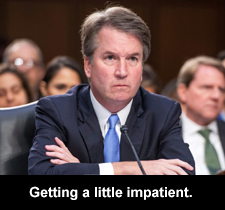Second chances.
 I come from the land of second chances, so the current Kavanaugh saga has a distinctly familiar ring to it. Mind you, I have not benefited from the level of privilege that Judge K has enjoyed his whole life through, but close enough. I grew up in what was described once as a "rock-ribbed Republican" town in upstate New York, virtually all white residents, lots of professionals and rich folk as well as middle class, borderline working class. It's the kind of place where you have to fuck up pretty badly before it affects you in any serious way. Underage drinking, drug use, and other low-level criminality were widespread. Arrests were not unheard of, but rare, and the impact of these brushes with the law were almost never life-changing.
I come from the land of second chances, so the current Kavanaugh saga has a distinctly familiar ring to it. Mind you, I have not benefited from the level of privilege that Judge K has enjoyed his whole life through, but close enough. I grew up in what was described once as a "rock-ribbed Republican" town in upstate New York, virtually all white residents, lots of professionals and rich folk as well as middle class, borderline working class. It's the kind of place where you have to fuck up pretty badly before it affects you in any serious way. Underage drinking, drug use, and other low-level criminality were widespread. Arrests were not unheard of, but rare, and the impact of these brushes with the law were almost never life-changing.
Right down the street, in the heart of the city, people of color face a far different reality. Their opportunities for advancement are severely constrained, and when something goes wrong, it's either life-changing or life-ending. I think about kids like Hector McClain, who at 16 was sent to prison for four years because he failed to stop two other teens from beating a Utica, NY police officer. Here's an excerpt of a press report about his trial:
As he was sentenced today, McClain acknowledged what he did was wrong. But McClain went on to defend his actions by saying he feared that his friends were going to be hurt by the officer.
“I only did it to make sure they were OK,” McClain said. “If you care about somebody, you’re going to do whatever it takes to keep them safe.” McClain added, “Nobody sees it the way I see it, know what I’m saying?”
Judge Dwyer said he understood McClain’s perspective to an extent, but still pointed out the flaw in McClain’s thinking. “This wasn’t just somebody on the street -- this was a police officer,” Dwyer said.
McClain replied, “I’m not saying my actions were right. I know they were wrong. I’m not a dummy ... But I’m still going to protect them no matter what.” Then Dwyer interjected, “You could have protected them better by stopping the incident.”
As the sentencing ended, McClain said, “I’ll just change my life around as soon as I get out.”
“You have to learn from your mistakes ... so we don’t have to go through this ever again,” Dwyer said. (Utica Observer-Dispatch, April 1, 2008)
Four years in prison, for a sixteen-year-old African-American kid. No mulligans for him. Meanwhile, on the other side of the track, white teens like me (a generation removed) commit felonies (albeit vacuous ones) in the shelter of their tony homes, where police patrols are tasked with keeping kids like McClain out, not hauling kids like me and Kavanaugh in. Our mistakes tend not to follow us like a malevolent cloud for the rest of our lives. When you couple that with the generations of advantages our families enjoyed - access to remunerative professions, mortgage assistance denied to black families, ingress into neighborhoods from which people of color were barred, and decades of building wealth - you begin to understand apartheid American-style.
Don't feel sorry for Kavanaugh. Even if he's held somewhat accountable and denied a lifetime appointment to the nation's highest court, he'll be just fine.
luv u,
jp
Comments